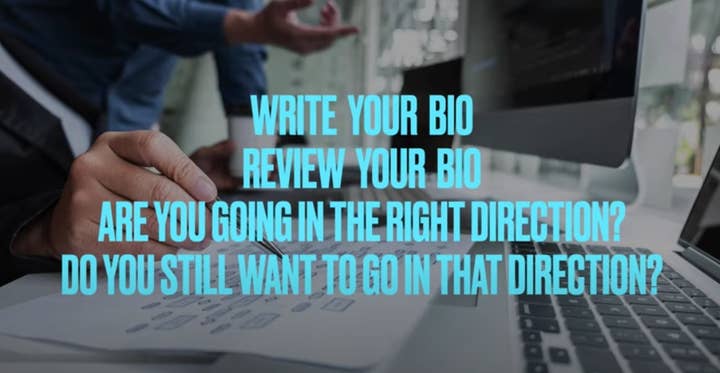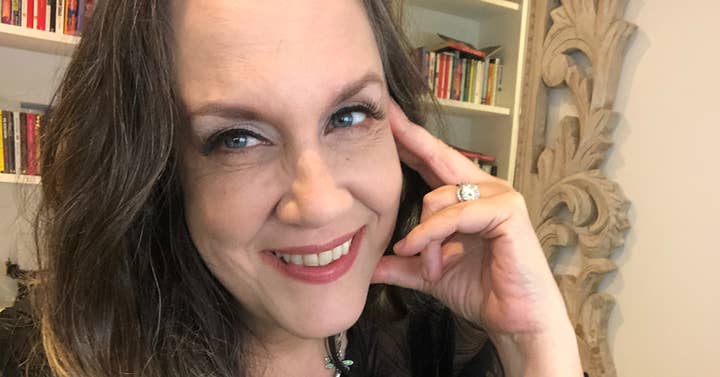Brenda Romero's tips for building your personal brand
Brenda Romero gives students advice on how to build and grow their reputation before even entering the industry
Thinking of yourself as a brand as you're about to enter the games industry can be a difficult exercise. But industry legend Brenda Romero believes it's a necessary one.
During a GamesIndustry.biz Live: Academy talk, entitled You: The Brand, she advocated for students and aspiring developers about to enter the industry to not only see themselves as brands, but also to think strategically about how to grow that brand.
"When we think of brands, we often think of company names like say Creative Assembly or games like their Total War: Warhammer," she said. "We might even think of people like say game director Hideo Kojima or writer and narrative designer Rhianna Pratchett. We might think of game director Amy Hennig or even say game programmer John Carmack.
"Each one of these individuals has name recognition within the game industry. You say their names to a fellow game developer and odds are they have heard of them, and they associate their names and the things that they do with quality. And that actually makes them a brand."
"Early branding, reputation, stick with people as they head into the professional world"
She added that thinking of yourself as a brand is anything but egotistical, and that whether you are in school or already in the industry, you are actually already a brand. She gave a few examples to show that it starts building up very early on, whether you realise it or not.
If you've ever done group work, you probably have heard a variation of one of the following: "I would never work with them again because they never show up," "Last time I did a project with them, it was a nightmare," or "If so and so in on the team, absolutely count me in."
"And you start to see that even before we've made real inroads into the industry, we're picking up on things here or there that are forming a brand," Romero said. "These are forms of early branding, something we might refer to as our reputation. And they stick with people as they head into the professional world. All of these things are a brand and show you why your brand is important."
So how do you establish your brand? And what is it made of? Romero had the answers.
How to figure out what your brand is
If you're still studying, it can be difficult to project yourself into the industry and know exactly what you brand could be. Romero suggested a very simple exercise to figure it out: think about who you are now, then think about who you will be in 2025.
"When I mentor people I ask them to write their bio, but I want them to write their bio as if it's five years from now," she explained. "And when I do, certain interesting patterns emerge. A fair few people want awards. Others want to be at the top of their field. If they're programmers, they want to be CTOs or technical directors. If they're game designers, they're looking to be creative directors or design directors. Others want to make sure that they have released a certain number of games.
"Creative director Shigeru Miyamoto has talked about knowing the core of your game and revisiting it again and again as you go through development to make sure that you're staying on track. Obviously that's excellent advice, but it's also excellent personal advice. So review your bio, and review it again and again, review it several times a year to see if you're still on track to be who you want to be."

You can ask yourself questions throughout the process: are you going in the right direction? And do you actually still want to go in that direction?
"I have known artists who became programmers, and programmers who became designers, and programmers who became producers," Romero said. "Give yourself time to get your footing but, like Miyamoto says, revisit the core again and again. And it's also fine to completely change direction. Miyamoto himself in fact was actually a toy designer. So if you take one thing away from this entire talk: please write your bio for 2025."
Romero took the example of a former student of hers, Will McCarty, to demonstrate how you can build your brand early on and work towards your goal.
"He played his career with the same tactical decision-making that he used to play games and it paid off in a big way"
"When he [was] still in high school, he looked at one ad for a job he'd want four years later when he graduated college. He was looking at where he wanted to be. So it turns out his answer for what he needed to learn was [everywhere].
"And here's what he was seeing when he was looking for ads: 'Extremely proficient in C++ programming and debugging.' And the more he looked, the more he saw the same thing. Everybody wanted C++, and so he found his answer. So Will goes through his entire undergrad and he graduates, and eventually Will does get a job in the game industry and today he is a senior software engineer at Glu [Mobile].
"He played his career with the same tactical decision-making that he used to play games and it paid off in a big way. So what do you want to be? If I had any advice, having worked with hundreds of people at this point: be the best in your class, the best in your job."
What your brand is made of
- Your portfolio
The path leading to your objective for the future is paved with elements that you have to perfect. While your reputation will follow you around during your studies and career, you can work towards improving it and making it stand out. Your portfolio is a prime example.
"When I talk to developers and find out what it is they're hoping to see in people's portfolios, I hear the same things again and again," Romero said. "They want to know who you are. They want you to show what you are, show your actual work. And show proof that you're making games. One of the easiest ways to leapfrog to the top of the resume pile is to actually have finished games on your site. You'd be surprised how many people don't."
She also advised to not make people "work for your work," meaning that you should keep things simple and clean.

"Don't have splash pages, have obvious thumbnails, keep the personal stuff off there -- it's just not necessary," she said. "And show your gameplay in videos. People don't want to have to download something, install it, get new drivers or whatever. Just show me your gameplay.
"Also bear in mind that you are as good as your worst image, your worst code sample, your worst writing or your worst game. So in many cases, less is more. If you are thinking: 'Oh my goodness, I only have five things to show,' if those are five good things, that's great. It's better than five good things and five not so good things because that's what they remember you for."
She added that she's been asked by several art directors to tell students to not put a car in their portfolio.
"They've seen a bazillion of them. Find something that makes you stand out: what's really unique about you? And if you're trying to target a specific company, make sure your portfolio reflects that direction and that decision of yours. Some companies even offer suggestions on what they're looking for on their websites."
- Your experience
What experience you have, even if it's very little, is also an integral part of your brand.
"The most hardcore programmers I know in the games industry are entirely self-taught"
"Many people, especially those getting into the industry, are like: but I don't have any experience, how am I supposed to get experience if I don't have any experience? Well, it doesn't necessarily mean job experience. You can teach yourself things. In fact, probably the most hardcore programmers I know in the games industry are entirely self-taught. So you can teach yourself lots of stuff and show proof of that.
"You can also do independent work. There's nothing stopping you from making a game yourself. Go to game jams and submit all those games for every single festival that you see that offer any kind of award, because if you win an award -- something say as big as the IGF -- that's huge. That will move mountains. And if you don't win an award you might get a nomination, and trust me that's not too bad either."
- Your resume
Having a good resume is also an important part of building your brand. And that's possible regardless of how experienced you are in the industry.
"Your resume should not be a tome, nor should it be needlessly abrupt," Romero advised. "Tell people what they need to know about you. [When looking] at a resume, people expect to see relevant experience, they don't want you to exaggerate.
"Proofread your resume and also customise it to the employer. Don't feel like you have to send out one single resume to everybody else. You might have a wide amount of experience but you want to tailor that to somebody -- and nobody necessarily cares about the coffee shop job that you had. What they want to see is the experience that you have that can benefit them.
"Another thing that is particularly important is just your involvement -- your involvement with the industry, your involvement with other creative people. So any volunteering you've done, speaking, podcasts, outreach, teaching: all of that stuff is important to show your passion and to show who you are as a person."
"Social media accounts are a reflection of you in the world. Make yourself stand out in a positive way"
- Your social media
Social media has taken a prominent position in many young people's lives, and it is also widely used in the industry as a way to showcase creations and network. But Romero wanted to remind students of the reality of social media as they build their reputation.
"In this day and age, social media is quite obviously really important, and though all of your social media accounts are obviously personal they are also a reflection of you in the world, and the internet is quite obviously forever.
"You can delete a tweet but you cannot delete a screen grab, and nothing is private -- not email, not DMs, not members-only forums. So always be careful. If you're gonna make yourself stand out, make yourself stand out in a positive way."
- Your cover letter
One way to stand out in a positive way can be through your cover letters, Romero said. If you're sending a CV for a position, it is still good practice to send a cover letter alongside it. But people always end up saying the same things in cover letters, so she advised to take a different approach.
"Everyone is the same sort of product. Think of yourself as a game: What's your hook? What is the reason that they should hire you? Your goal is to make yourself stand out in some way.
"I would say typically generalist [roles] are not what people are looking for when they're first entering the industry, unless they're equally good at a range of things. So find your love, follow it, and prove that you can do it."
You can rewatch all the videos from GamesIndustry.biz Live: Academy on this page.
More GamesIndustry.biz Academy guides to Working in Games
Our guides to working in games cover everything from how to get a job in the industry to how to avoid burnout:


